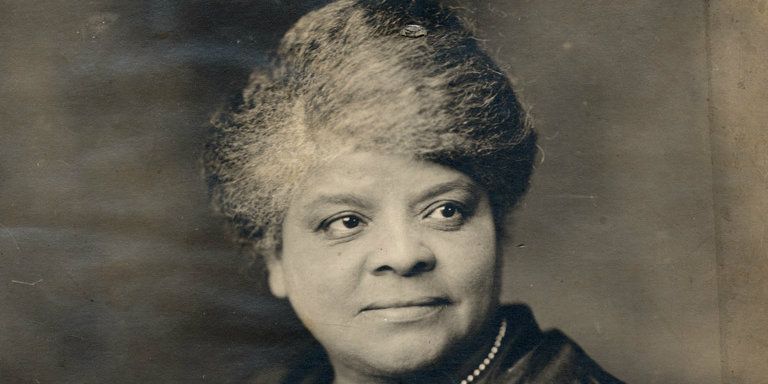A Fearless Heroine: What We Should All Know About the Legacy of Ida B. Wells

July 16th marks the birthday of eminent journalist, Ida B. Wells, whose early leadership in the civil rights movement and endless fight to shed light on injustices on behalf of women and the Black community makes her an unforgettable champion of truth. Whether you want to get familiar with the renowned female crusader’s life for the first time or you need to get re-acquainted with her work, be prepared to see into the compassionate heart and brilliant mind of one of history’s greatest figures.
The Early Years
“I came home every Friday afternoon, riding the six miles on the back of a big mule. I spent Saturday and Sunday washing and ironing and cooking for the children and went back to my country school on Sunday afternoon.”
Born in Holly Springs, Mississippi in 1862, Ida B. Wells was one of seven children. Although her parents were once slaves before the signing of the Emancipation Proclamation, they were fortunate to financially support Wells and her siblings making a living as a cook and a carpenter. Tragedy struck during Wells’ teen years, however, when Yellow Fever killed both of her parents, forcing her to find work as a teacher for the sake of keeping her younger siblings together as a family. At the time, earnings for black educators were significantly lower than that of white educators, so she moved to Memphis, Tennessee, where the pay was better.
“I refused, saying that the forward car was a smoker, and as I was in the ladies’ car, I proposed to stay…”
Wells’ transfer to Memphis would prove to be the spark that ultimately fueled her lifelong commitment to social justice. In 1884, she got into an altercation with a white train conductor of the Chesapeake & Ohio Railroad Company because she refused to relinquish her seat and go to the malfunctioning ‘Jim Crow’ car as she was instructed. Wells’ refusal, an incident that took place 7 decades before the famous occurrence on a bus with passenger Rosa Parks, led to a triumphant lawsuit against the train company and a newspaper article in a black church weekly, The Living Way, which earned her public acclaim.
“The people must know before they can act, and there is no educator to compare with the press.”
After the train case, Wells resumed teaching but also answered her call to writing for justice. She wrote weekly articles for The Living Way under the pseudonym ‘Lola’, gaining her an audience that was devoted to seeing her cover racial injustice. Wells was also offered a position at the Evening Star. Then, she co-founded the Free Speech and Headlight, a paper that found significant support from the Black churches in Memphis. This endeavor eventually led to Wells’ early retirement from teaching and a vibrant life in journalism.
Investigative Journalism and Anti-Lynching Campaign
“Our country’s national crime is lynching. It is not the creature of an hour, the sudden outburst of uncontrolled fury, or the unspeakable brutality of an insane mob.”
As Wells rose to prominence, one of the biggest atrocities to stain the nation’s social landscape was occurring: the public lynching of Black men. Tragedy hit close to home when three of her friends became victims of this crime that caused bitter social unrest. Despite being threatened with violence on several occasions, Wells courageously plunged into her research and writings on lynching and eventually created an anti-lynching campaign which raised funds to further her investigations.
Her famous pamphlet “Southern Horrors: Lynch Laws in All its Phases” in 1892 and ‘A Red Record’ in 1894 revealed the reasons behind these brutalities. Economic competitiveness with whites, failure to submit to racially charged laws, and public drunkenness were a few of the causes, but one of the most prevalent justifications was engaging in sexual relations with a white woman. In her work, Wells exposed the southern myth of white women being raped by black men and indicated that most of these interracial affairs were consensual, warranting no violation on the Black man’s behalf.
Women’s Suffrage
“I will not begin at this late day by doing what my soul abhors; sugaring men with flattery to retain them as escorts or to gratify a revenge.”
After Wells’ newspaper office was destroyed by angry whites who protested the distribution of her literature, she followed her own advice to Memphis residents and moved out of town. She settled in Chicago and remained dedicated to uncovering more truths on lynching, but also began her activism for women’s rights. Along with Susan B. Anthony and Jane Addams, Wells became a primary figure in the Women’s Suffrage Movement that voiced intolerance for unfair treatment affecting women’s private and public lives.
Political Involvement
“If this work can contribute in any way toward proving this, and at the same time arouse the conscience of the American people to a demand for justice to every citizen, and punishment by law for the lawless, I have done my race a service.”
Wells married and started a family, but her work outside of the home didn’t remain on the backburner for long. The fiery activist went on to help further the advancement of Black people by joining forces with W.E.B. DuBois among others, in the formation of the NAACP in the early 1900’s. Although she faced many internal hiccups in the organization, she continued to publicly denounce racism and the inhumane acts that characterized it. Wells-Barnett ran for the Illinois State legislature in the 1930’s a year before her death as well, making her one of the first African-American females to run for public office.

No comments: